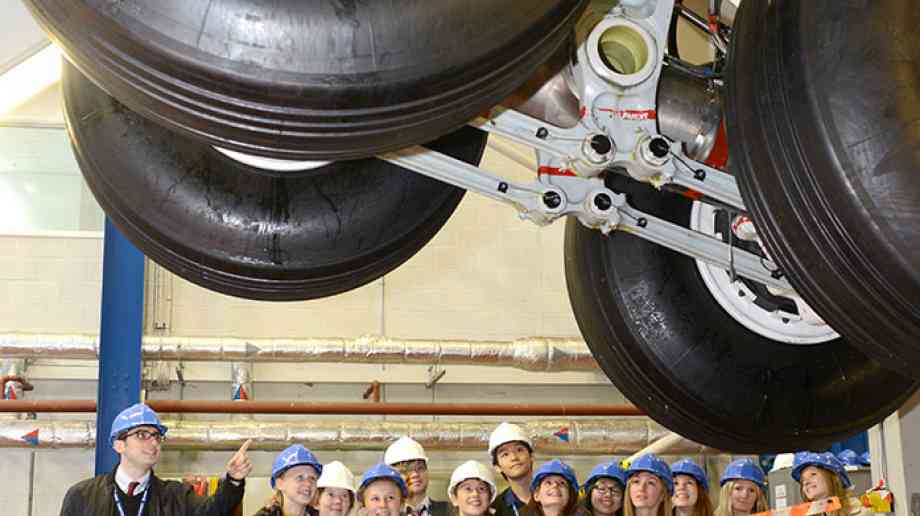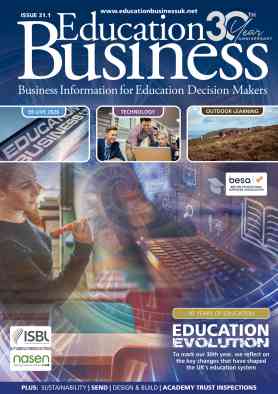
The link between STEM education and future jobs
To close the STEM skills gap, there is a significant role for businesses and schools to link activities to give young people an insight into STEM industries. Julie Feest, CEO of the Engineering Development Trust (EDT) explores the current state of STEM engagement in schools
The government published its Industrial Strategy for the UK towards the end of 2017. The strategy had much to say about education and its role in ensuring that UK businesses have the talents, skills and labour that they need to thrive.
The White paper states:“In the past we have given insufficient attention to technical education. We do not have enough people skilled in science, technology, engineering and maths.”
In particular, the White paper outlined the policies that impact education. These include establishing a technical education system that rivals the best in the world and to invest an additional £406 million in maths, digital and technical education, helping to address the shortage of science, technology, engineering and maths (STEM) skills.
Closing the STEM skills gap
To maximise the value of these initiatives in closing the STEM skills gap there is a significant potential role for business and education linking activity which provides young people with an insight into STEM industries. Through this activity they will learn how their STEM studies feed into socially valuable projects in the commercial world and be able to see the tremendous career opportunities that exist within STEM industry.
I believe that there is a role for government in encouraging such linking and the establishment of 2018 as the Year of Engineering, pre-figured in the Industrial Strategy White paper, is a recognition that they understand the need to inspire young people in to STEM careers, not simply to teach them STEM.
The Year of Engineering is “a government campaign, which celebrates the world and wonder of engineering”. Recognising the big shortage of young people who see engineering as a job for them, the Year of Engineering aims to “shake-up people’s ideas about engineering, inspiring the next generation of innovators, inventors and problem solvers by showing them what engineers actually do”. It is an important invitation to business and education to focus on this issue for 2018 and build effective links that will hopefully last much longer than a year.
Some argue that this area of school STEM engagement suffers from too many initiatives; indeed, the latest Engineering UK: State of
Engineering report says that some 600 UK organisations run STEM engagement initiatives directed at schools and questions the quality assessment of activities.
While many of these initiatives won’t involve experience in industry, the report is right in saying that teachers may find it difficult to navigate the complex landscape of STEM engagement. While it is true that The Year of Engineering is another initiative, it is one that I hope will have the weight of government behind it to enable it to penetrate the consciousness of young people and change their thinking on Engineering and perhaps other STEM careers as well.
Industrial Cadets
I think it is right that the landscape of employer/education engagement needs some navigational aids and one advance in this area of which I am particularly proud is the recent development and expansion of Industrial Cadets, an accreditation for experiences of industry which ensures that experiences on offer deliver best practice and good information to young people.
The seed for Industrial Cadets was planted by HRH The Prince of Wales in discussions with steel managers in the North East of England and has now developed into an organisation which accredits hundreds of diverse experiences of industry each year and gives young people an “Industrial Cadet” award at Gold, Silver or Bronze level to put on their CVs so that future employers know the quality and nature of the workplace experience they have had.
Schools and teachers have not been slow to appreciate the benefits of Industrial Cadets in assuring the quality of the programmes that their young people can engage with, but some schools are taking the use of Industrial Cadets into their core curriculum in novel ways. At the Industrial Cadet Awards in early March this year, two schools particularly stood out for the way they were using the Industrial Cadet structures in their delivery of education.
Cambridge Academy of Science and Technology is a 14-19 specialist STEM college which as a University Technical College (UTC) utilises project-based learning for students at least one day per week to give them practical skills alongside academic achievement. These extended projects are designed and delivered in collaboration with local employers.
The college has incorporated Industrial Cadet Awards into both its GCSE and Sixth Form curricula as it believes that the aims of the award reflects those of the college. Over the past three years the college has extended the certification of projects that carry the Industrial Cadet Award so that this year all Year 10 students will complete Silver level awards and all year 12 will complete Gold Level Awards.
Projects certified for Industrial Cadet awards include computer science, civil engineering, biological sciences, and engineering. Both the Awards are fully integrated into the college curriculum. The college is now working with over 40 businesses and its curriculum is recognised nationally.
City College, Burslem, which opened three years ago, has a unique partnership with the Industrial Cadets, aimed at enhancing its Pre-Apprenticeship Learning Programme and this programme is now in demand across other areas of the country. The success of this programme has seen 100 per cent of students achieve the Industrial Cadets Gold Award. This achievement has made a significant contribution to 80 per cent of students gaining an apprenticeship year upon year.
The pre-apprenticeship programme includes two days at the City College and three days in a work experience placement following a unique four-week programme which has been designed by business for business and is led by businesses who provide workshops and work-related learning visits to key industrial partners.
This was co-created in partnership between City College and its Business Partnership Group, who have been instrumental in creating the curriculum students follow.
City College is in the process of scaling up its pre-apprenticeship programme due to demand from students from other secondary schools in the area. It also has plans to use the Industrial Cadet Accreditation for an ‘A’ level enrichment programme which can include elements of volunteering, and in its plan to develop the new ‘T’ Level qualifications that it has been invited to help develop by the government. This will support students of STEM subjects who want either to go to university or to undertake an apprenticeship.
These are two schools that are taking employer/education engagement into the core curriculum in innovative ways by using Industrial Cadets. If the government’s Industrial Strategy is to be successful in closing the STEM skills gap, I believe the current relationships between employers and schools will have to move more towards embedding experience of industry in the core curriculum, and forward-thinking schools will be looking at how this might be achieved.
Future jobs
One further observation before I sign off. Predictions for future jobs in the light of the current fourth Industrial Revolution emphasise the need, not just for technical understanding, but for creative ingenuity and non-cognitive skills.
HRH The Prince of Wales caused a little controversy at the March Industrial Cadets event by commenting that creative arts “were in danger of being forgotten and left out within the school system.” I think he has hit on an important point.
Future jobs will require STEM learning to be blended with high levels of communications and creative thinking skills of the sort that creative arts provide. We should never be dividing our young people into the scientists and the artists, it is a false dichotomy and one which will not help future employability.
Our ‘T’ level pathways need to recognise STEAM skills for young people, where creative arts sit comfortably alongside STEM learning. It is radical change in thinking, but one we need to embrace if we are to properly equip our young people for the future jobs which haven’t even been thought of yet.
Further Information:Latest News
02/02/2026 - 13:08
The Department for Education has opened applications for 1,500 schools to sign up for its Best Start free breakfast clubs in September.
02/02/2026 - 09:36
The Welsh Government has published a consultation to gain views on extending its Talk With Me programme so that it can support 5 to 11-year-olds with their speech, language and communication skills.
30/01/2026 - 10:20
Ordnance Survey (OS) is offering its free education resource for the teaching of geography to 1,800 primary and secondary schools in some of the most deprived areas of Great Britain.
29/01/2026 - 10:37
The Education Business Awards recognise the leadership, innovation, operational decisions and strategic planning that help schools run more effectively and deliver better environments for both staff and pupils.
29/01/2026 - 10:26
The Education and Work and Pensions Committees have launched a joint inquiry investigating how the Government’s new Child Poverty Strategy, announced last month, can meet its aims.







